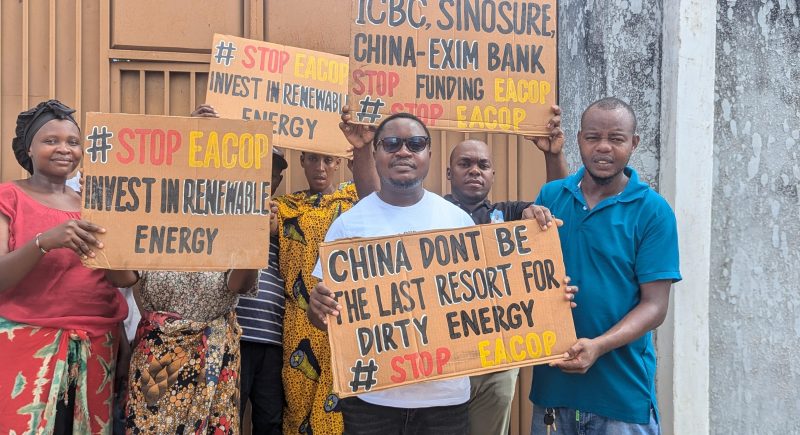On Sunday, December 8, 2024, East African Crude Oil Pipeline (EACOP)-impacted communities gathered in Kikuube district in Uganda to hold a press conference and peaceful demonstration in response to the recent claim by the Government of Uganda indicating that financing for the controversial East African Crude Oil Pipeline would come through from numerous Chinese state-owned entities by the end of December 2024.
Since September 2023, the Government of Uganda has repeatedly stated that Chinese financial institutions, including Sinosure and China Exim Bank, are expected to finance the project.

StopEACOP protesters
However, the anticipated support from China appears to have been delayed, prompting EACOP shareholders to increase their equity stake from 40% to 52%.
However, the silence from the Chinese stakeholders regarding the claims by the Government of Uganda has raised serious concerns among the affected communities and civil society in Uganda and Tanzania.
These concerns are further compounded by the significant role already played by the Chinese National Offshore Oil Corporation (CNOOC) and various Chinese contractors in the operation and development of EACOP and its associated projects.
During the press conference, community leaders and impacted persons put forward clear demands for the Chinese financial and insurance actors, including Sinosure, China Exim Bank and the Industrial and Commercial Bank of China to decline any and all support for EACOP, emphasising the immense environmental and socio-economic harm caused by the pipeline and its associated projects.
Impacted communities have also put out clear calls for Chinese commercial and political decision-makers to prioritise mutually beneficial developmental partnerships with their communities, with their country and with the continent as a whole – stressing the potential role that the Chinese state and its entities could play in spurring meaningful growth through the provision of support for decentralised renewable energy infrastructure and other green economic and social development initiatives.
On Thursday December 11, 2024, activists in Kampala and Dar Es Salaam marched to the embassies of China in Uganda and Tanzania respectively to ensure that the demands, testimony and aspirations of EACOP-impacted communities are heard and treated seriously by Chinese stakeholders who continue to consider throwing their weight behind EACOP and its associated projects.
The campaign calls on Chinese financial institutions to respect the decision of affected people and to publicly commit to not funding the project or the associated oil fields.
“We urgently call upon the Chinese government and its financial institutions to publicly refute these claims about funding this controversial pipeline, address outstanding human rights violation allegations against CNOOC Uganda, engage meaningfully with local communities living in the Albertine region where CNOOC operates, and explore renewable energy investments,” said Balach Bakundane, Coordinator of EACOP Host Communities Organisation (EACOP-HC), Uganda.
“The oil and gas sector in Uganda has been characterised by human rights violations, environmental and biodiversity destruction, and widespread land grabbing that disrupts household livelihoods. The CNOOC-led Kingfisher project has further exacerbated these issues, with reports of destroyed fishing equipment, the arrests and assaults of community members protesting these injustices, and a troubling rise in sexual and gender-based violence. These violations are unacceptable in any society.
“We urge Chinese financial institutions and insurance companies to demonstrate leadership and solidarity by rejecting financing for projects that harm our communities, do not make sound economic sense, destroy the environment, and contribute to the climate crisis,” Samuel Okulony, Executive Director of Environmental Governance Institute (EGI), Uganda, said.
“The choice is clear: Chinese entities must not replicate the exploitative and destructive agenda of the West. We marched to the embassy in Dar Es Salaam today because, like our brothers and sisters in Uganda, our communities are suffering- displaced from their lands and stripped of their livelihoods.
“We demand that Chinese decision makers engage with us, listen to our voices, and pursue real alternatives that prioritise people over profit,” said Richard Senkondo, Executive Director of the Organisation for Community Engagement (OCE), Tanzania.
“Chinese state-owned institutions are at a critical crossroads: they must decide whether to back destruction, exploitation, and neo-colonial plundering, or align themselves with the growing global consensus rejecting the East African Crude Oil Pipeline (EACOP). The tide is turning against projects like EACOP, with 42 major banks and 28 (re)insurance companies already distancing themselves from its devastating environmental and social impacts.
“Communities affected by EACOP have been vocal and resolute in their demands for justice and an alternative developmental path. It would be both careless and reckless for Chinese decision-makers to dismiss these calls. Doing so risks not only significant reputational damage across the African continent, where trust and cooperation are essential, but also potential financial fallout from a project rife with controversy and opposition,” declared Zaki Mamdoo, StopEACOP Campaign Coordinator.
